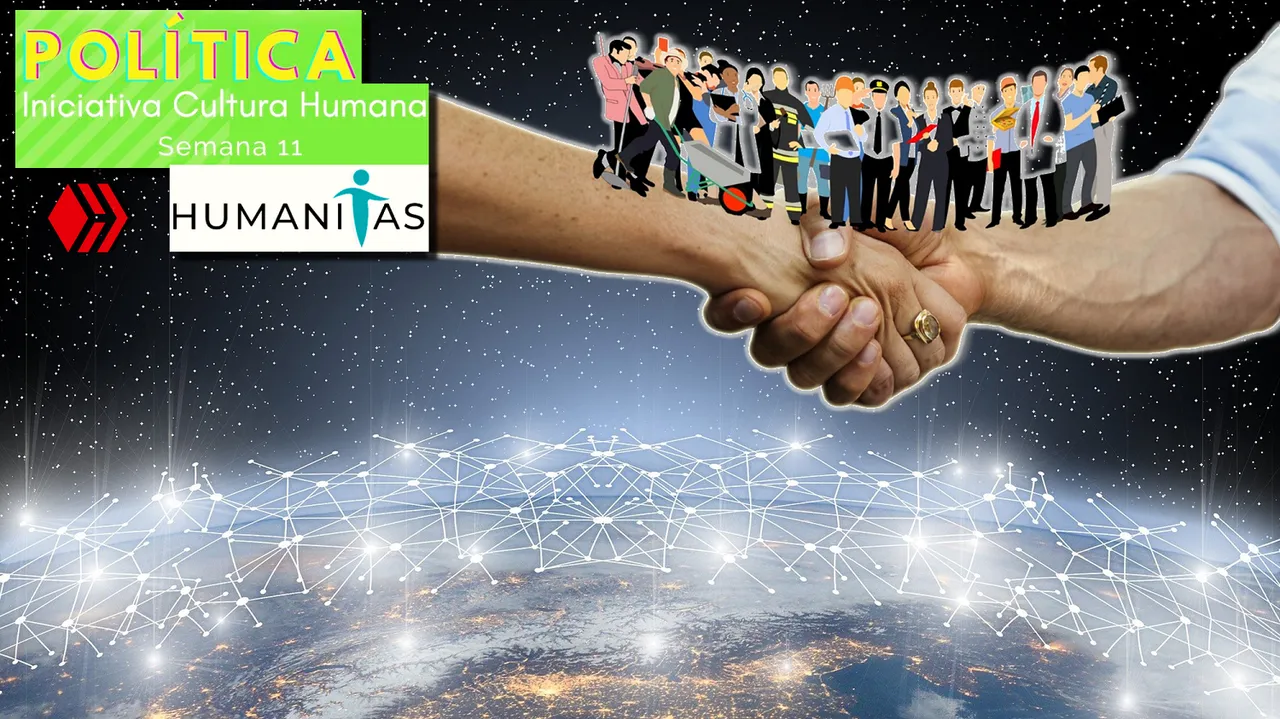Política. Un área “espinosa” para los debates en cualquier nivel. Pero esta semana en #Humanitas reflexionamos al respecto de este tema. Te invitamos también a participar si tienes una idea más o menos formada respecto de la política desde el punto de vista humano o de cómo podría ser esta mejor para el desarrollo de la humanidad. Hay puntos interesantes propuestos en la iniciativa, te invito a leerla:
Este es el enlace de la iniciativa: Iniciativa: Cultura Humana semana 11: Política. En la comunidad Humanitas.

La frase de Aristóteles “El ser humano es un ser político” se refiere al humano como parte de una “polis” (sociedad o ciudad). Pero a mi modo de entender, se da en cualquier lugar donde existan humanos. Es decir, seguramente habrás visto series o películas de ficción en donde un grupo de personas se pierde en la selva o intenta sobrevivir en un entorno remoto. Eventualmente, la supervivencia del grupo depende de las relaciones políticas entre todos. Siempre surge un líder, o líderes, algunos que son buenos para ciertas tareas, etc.
Ese líder, líderes, o personas más fuertes del grupo, suelen ser los que asociaríamos con un gobierno o Estado hoy en día, encargado de garantizar la seguridad del país y tomar ciertas decisiones. Pero al hacerse muy grande la población, la visión de un “líder” se hace muy abstracta. Las relaciones políticas se hacen complicadas de entender para la mayoría de la población, cosa que por lógica no debería ser así porque de eso depende la “estabilidad” de la sociedad. Quizás lo más adecuado para el ser humano es organizarse de la manera más descentralizada posible y fortalecer las relaciones políticas de manera local.

La frase de Aristóteles quizás podría tomarse como muy cierta, pero no en el sentido de que todos deberían estar involucrados o estar siempre pendientes de la política (o politiquería) sino de que de esas relaciones entre personas depende la estabilidad de la sociedad. Creo que cuando se dice que una persona es “idiota” (apolítico o sin interés en la política) se refiere a eso, no necesariamente a tener que identificarse con una ideología o partido.
Ha habido algunos pensadores en la historia que han planteado sistemas políticos muy conocidos. Pero creo que ha habido algunos planteamientos bastante interesantes que poco se han puesto en práctica. Por ejemplo, antiguamente el espectro de lo que llamaríamos “izquierda” tenía diferentes afinidades a las de hoy. Un filósofo francés llamado Proudhon planteó el Mutualismo, un sistema que combina el libre mercado con cooperativas y propiedades colectivas. Te invito a leer esta publicación que escribí hace un tiempo, en donde se hace el paralelismo entre la blockchain de Hive y el mutualismo. Podría decirse que Hive tiene ciertos elementos de mutualismo.

Desde el lado de lo que hoy consideraríamos “derecha” ha habido planteamientos poco conocidos por ciertos pensadores que quizás incluso se asemejan mucho a la filosofía de las criptomonedas actualmente. Spooner, Spencer, Cobden, entre otros un poco más conocidos como Rothbard y Hayek, plantearon la idea de sistemas políticos en donde las personas se organizan en libertad para comerciar entre sí y conformar incluso gobiernos a los cuales la población se asocia voluntariamente. El enfoque es garantizar seguridad. El que es quizás el más “extremo” de estos, Rothbard, planeta incluso eliminar todo rol del Estado y que la justicia, la seguridad, salud, etc., sea totalmente proveída por empresas privadas.
Estas dos visiones tienen algo en común: no hay Estado, es decir, son anarquistas. En un mundo donde podría decirse que los Estados son más fuertes que nunca es difícil imaginar una sociedad así. Pero, desde mi punto de vista, si existiese una propuesta política perfecta, sería una donde las personas puedan ser libres y lograr llegar a ser lo suficientemente autónomas para que ellas tengan poder sobre el gobierno y no al revés. Cabe destacar que el término “anarquía” no quiere decir que no puedan existir gobiernos, sino más bien que las personas conforman voluntariamente esas relaciones políticas para mantener la estabilidad.

Ahora, saliéndonos un poco de lo utópico y yéndonos a la realidad, lo mejor que tenemos en la actualidad es la democracia, con sus virtudes y defectos. Pero también podemos ver que algunas monarquías han logrado cierto nivel de prosperidad que muchas democracias no han logrado (Liechtenstein, Dinamarca, Noruega, Australia, etc.). De manera que más allá de si las personas puedan votar o no por un presidente, creo que lo importante es que las personas puedan elegir o tener poder sobre la realidad de su entorno, que existan relaciones políticas saludables en la población y una cultura que fomente el desarrollo. La democracia en cierto sentido es libertad de elegir.
Hablando de otro punto mencionado en la iniciativa, se suele pensar mucho acerca de que el desarrollo y bienestar de los países está a cargo de los políticos y el Estado. Pero, en realidad, creo que estos no deberían ser los encargados de ello sino que más bien sean los encargados de crear las condiciones para que haya. La misma sociedad debería ser la principal responsable de su propio bienestar, y la cultura es parte importante de eso. Y lo mejor que puede hacer una persona para ser partícipe es educarse o tratar de ser una persona íntegra y justa para fortalecer las relaciones políticas de su entorno. Una sociedad atomizada y con cultura débil es más susceptible de ser gobernada por Estados más autoritarios.
Creo que la política es algo muy natural del ser humano, tal como en el ejemplo que he puesto al principio de la selva. Depende mucho de su cultura, algo también muy humano. La reflexión es que seamos más políticos, como dice Aristóteles, y menos politiqueros.
¡Gracias por leer! Te leo en los comentarios.
Invito a participar a @norberto1 @alexandermoreno

Politics. A "thorny" area for debates at any level. But this week in #Humanitas we reflect on this topic. We also invite you to participate if you have a more or less formed idea about politics from the human point of view or how it could be better for the development of humanity. There are interesting points proposed in the initiative, I invite you to read it:
This is the link to the initiative: Initiative: Human Culture week 11: Politics. In the Humanitas community.

Aristotle's phrase "The human being is a political being" refers to the human being as part of a "polis" (society or city). But to my way of understanding, it is given in any place where humans exist. I mean, surely you have seen fiction series or movies where a group of people get lost in the jungle. Eventually, the survival of the group depends on the political relations between everyone. There always emerges a leader, or leaders, some who are good at certain tasks, and so on.
That leader, leaders, or strongest people in the group, are usually the ones we would associate with a government or state today, in charge of ensuring the security of the country and making certain decisions. But as the population becomes very large, the vision of a "leader" becomes very abstract. Political relations become complicated to understand for the majority of the population, which logically should not be the case because the "stability" of society depends on it. Perhaps the best thing for human beings is to organize themselves in the most decentralized way possible and strengthen political relations locally.

Aristotle's quote could perhaps be taken as very true, but not in the sense that everyone should be involved or always be aware of politics (or politicking), but rather that the stability of society depends on these relationships between people. I think that when it is said that a person is an "idiot" (apolitical or uninterested in politics) it refers to that, not necessarily to having to identify with an ideology or party.
There have been some thinkers in history who have put forward well-known political systems. But I think there have been some quite interesting approaches that have been little put into practice. For example, in the old days the spectrum of what we would call "left" had different affinities than it does today. A French philosopher named Proudhon proposed Mutualism, a system that combines the free market with cooperatives and collective property. I invite you to read this post I wrote a while back, where the parallel between the Hive blockchain and mutualism is made. Arguably, Hive has certain elements of mutualism.

From the side of what today we would consider "right wing" there have been little known approaches by certain thinkers that perhaps even closely resemble the philosophy of cryptocurrencies today. Spooner, Spencer, Cobden, among others a little better known as Rothbard and Hayek, put forward the idea of political systems where people are organized in freedom to trade with each other and even form governments to which the population is voluntarily associated. The focus is on ensuring security. Perhaps the most "extreme" of these, Rothbard, even plans to eliminate all role of the state and have justice, security, health, etc., provided entirely by private companies.
These two visions have one thing in common: there is no state, i.e., they are anarchists. In a world where States are arguably stronger than ever it is hard to imagine such a society. But, from my point of view, if there were a perfect political proposal, it would be one where people can be free and become autonomous enough for them to have power over the government and not the other way around. It should be noted that the term "anarchy" does not mean that governments cannot exist, but rather that people voluntarily form such political relationships to maintain stability.

Now, moving a bit out of the utopian and into reality, the best we have today is democracy, with its virtues and defects. But we can also see that some monarchies have achieved a certain level of prosperity that many democracies have not (Liechtenstein, Denmark, Norway, Australia, etc.). So beyond whether or not people can vote for a president, I think what is important is that people can choose or have power over the reality of their environment, that there are healthy political relationships in the population and a culture that fosters development. Democracy in a certain sense is freedom of choice.
Speaking of another point mentioned in the initiative, it is often thought that the development and welfare of countries is the responsibility of politicians and the state. But, in reality, I believe that they should not be in charge of it, but rather that they should be in charge of creating the conditions for it. Society itself should be primarily responsible for its own well-being, and culture is an important part of that. And the best thing a person can do to be a participant is to be educated or try to be a person of integrity and fairness to strengthen political relations in their environment. An atomized society with a weak culture is more susceptible to be governed by more authoritarian states.
I believe that politics is something very natural to human beings, as in the example I gave at the beginning of the jungle. It depends a lot on their culture, something also very human. The reflection is that we should be more political, as Aristotle says, and less politicking.
Thanks for reading! I read you in the comments.
I hope you enjoyed this reading. Leave your comment or opinion.
Translated to English language with the help of DeepL.com
Otras redes sociales:
 |
 |
 |
 |
F1 & motorsports: @acontmotor
 |
 |
 |
 |
| ¡Gracias por visitar! — ¡Thanks for visiting!  |
